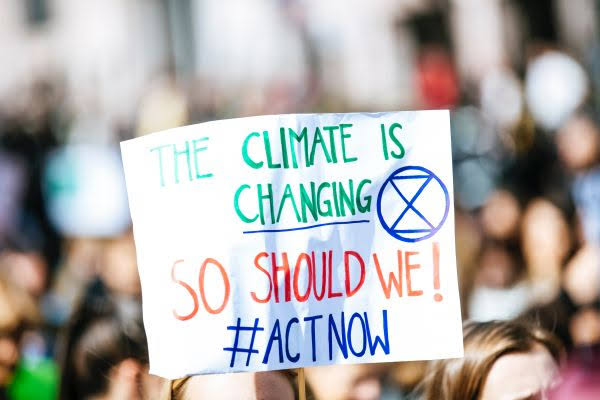MAKUENI,Kenya, Nov, 24 – During his opening remarks at the seventh instalment of the annual devolution conference being held in Makueni county, president Uhuru Kenyatta warned that Kenya must act now and be at the forefront of change if it is to win the battle against climate change.
Despite Kenya’s role in precipitating the global problem being negligible, contributing less than one per cent of the current global green house emissions, the country sits at number 31 as the most vulnerable nation to climate change.
“In the last two years, we witnessed the worst locust outbreak in 25 years, which left about one million people food-insecure in the Horn of Africa. The rising water levels of the Rift Valley Lakes, Lake Victoria and Turkwel Gorge Dam have displaced nearly 400,000 people in thirteen counties and affected biodiversity, including flamingoes in Lake Nakuru,” said President Kenyatta.
Generally, climate change is said to result in the loss of three per cent of the country’s gross domestic product (GDP) annually.
The current drought in the country where at least 2.5 million people are said to be battling serious famine is said to be as a result of the changing weather dynamics globally.
Kenyatta declared drought a national disaster calling on all hands on deck to address the crisis.
23 counties are battling the ongoing drought in the country.
With one of this year’s conference’s theme focusing on climate change specifically the multi-level governance for climate action, President Kenyatta has called on the devolved units to address the matter through the development of more robust and focused execution of mitigation and adaptation strategies.
“At the national level, my Administration has adopted a comprehensive set of policies, rules, and procedures to address climate change. This effort, as you are all aware, has culminated in the development of the following key instruments:The Climate Change Act (2016),The National Drought Management Authority Act (2016),The National Climate Change Framework Policy (2018),The National Climate Finance Policy (2018),The National Climate Change Action Plan (2018-2022),The National Adaptation Plan (2015-2030); and The Green Economy Strategy Implementation Plan (2016-2030),” he said.
Meanwhile globally, nations have come together and established the United Nations Framework Convention on Climate Change.
Kenya is signatory to the UN Framework Convention and has participated and made significant contributions during the just concluded UN Climate Change Conference in Glasgow, United Kingdom.
“These policies are currently being mainstreamed through the sectors in forestry, agriculture, water, energy, waste management and health. It is important to underscore that since most of these functions are devolved under schedule 4(2) of the Constitution, it is critical that the two levels of government work closely if we are to execute them effectively,”
Nations globally are working overtime to prevent the global temperatures from rising above 1.5 degrees Celsius.
Kenya recently joined the Adaptation Action Coalition and the UN Call for Action on Adaptation and Resilience.
The move Kenyatta said sends a clear political statement that Kenya will continue to work with other like-minded governments, institutions, business, and civil societies to accelerate action to moderate the negative impacts of climate change, facilitate adjustment to expected climate impacts and strengthen capacity to absorb, and recover from climate change effects.
At least 33 counties including Makueni, Wajir, Garissa, Isiolo and Kitui have developed County specific laws on climate change in turn also establishing climate change units while setting aside a fund for climate change mechanisms.
“The National Climate Change Action Plan (2018 – 2022) spells out bold strategies that put us on a sustainable growth path. It further underscores the need for adaptation and enhanced climate change resilience for vulnerable groups including women, youth, persons with disabilities, and the marginalized communities,”
One of the key deliverables in the Action Plan is to increase the country’s forest cover in the medium term, from approximately 6.9% of our land area to at least 10% by 2022.
‘Kenya, A Pioneer In Renewable Energy’
Kenya is ranked fifth globally on geothermal energy, “where our potential stands in excess of 10,000 MW, while only 10% of has been exploited to date.”
Kenyatta revealed that the country is on track to ensuring a 100 per cent transition in the use of clean cooking energy sources by 2028 -This is through the use of innovative approaches to expand access to energy through off-grid solar power and other clean cooking energy sources.
The country is also on track to install Africa’s biggest wind power project in Turkana.
The Turkana Wind Power is now fully operational; with an output of about 310 MW of clean energy.
“Kenya has outlawed use, manufacture, and importation of single use plastic bags, as a way of protecting and conserving our environment. The two levels of government are investing on sustainable waste management projects to achieve a net zero plastic waste by 2030,” said the president.
Kenya has committed to reduce her greenhouse gas emissions by 32% by 2030. This will cost Sh 6.874 billion (US $ 62 billion). Out of this figure, Kenya will mobilize 13% from domestic sources, while we expect fund the balance of 87% from the external sources.
Want to send us a story? Contact Shahidi News Tel: +254115512797 (Mobile & WhatsApp)


